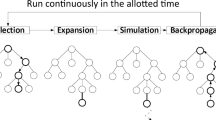Abstract
A general game player automatically learns to play arbitrary new games solely by being told their rules. For this purpose games are specified in the general Game Description Language (GDL), a variant of Datalog with function symbols that uses a few game-specific keywords. A recent extension of basic GDL allows the description of nondeterministic games with any number of players who may have incomplete, asymmetric information. In this paper, we analyse the epistemic structure and expressiveness of this language in terms of modal epistemic logic and prove two main results: (1) The operational semantics of GDL entails that the situation at any stage of a game can be characterised by a multi-agent epistemic (i.e., S5-) model; (2) GDL is sufficiently expressive to model any situation that can be described by a (finite) multi-agent epistemic model.
Similar content being viewed by others
References
Apt, Krzysztof, Howard A. Blair, and Adrian Walker, Towards a theory of declarative knowledge, in J. Minker, (ed.), Foundations of Deductive Databases and Logic Programming, chap. 2, Morgan Kaufmann, 1987, pp. 89–148.
Aumann Robert, Adam Brandenburger (1995) Epistemic conditions for Nash equilibrium. Econometrica 63, 1161–1180
Fagin, Ronald, Joseph Y. Halpern, Yoram Moses, and Moshe Y. Vardi, Reasoning About Knowledge, The MIT Press: Cambridge, MA, 1995.
Gelder, Allen Van, The alternating fixpoint of logic programs with negation, in Proceedings of the 8th Symposium on Principles of Database Systems, ACM SIGACTSIGMOD, 1989, pp. 1–10.
Gelfond, Michael, and Vladimir Lifschitz, The stable model semantics for logic programming, in R. Kowalski, and K. Bowen, (eds.), Proceedings of the International Joint Conference and Symposium on Logic Programming (IJCSLP), MIT Press, Seattle, OR, 1988, pp. 1070–1080.
Genesereth Michael, Nathaniel Love, Barney Pell (2005) General game playing: Overview of the AAAI competition. AI Magazine 26(2):62–72
Halpern, Joseph Y., and Moshe Y. Vardi, The complexity of reasoning about knowledge and time, in Proceedings 18th ACM Symposium on Theory of Computing, 1986, pp. 304–315.
Hintikka, Jaakko, Knowledge and Belief, Cornell University Press, Ithaca, NY, 1962.
Huang, Xiaowei, Ji Ruan, and Michael Thielscher, Model checking for reasoning about incomplete information games, in Proceedings of the Australasian Conference on Artificial Intelligence, Springer LNAI 8272, Dunedin, New Zealand, 2013, pp. 246–258.
Kripke Saul (1963) Semantical analysis of modal logic. Zeitschrift für Mathematische Logik und Grundlagen der Mathematik 9, 67–96
Lloyd, John, Foundations of Logic Programming, second, extended edn., Series Symbolic Computation, Springer, 1987.
Lloyd, John W., Rodney W. Topor,(1986) A basis for deductive database systems II. J. Log. Program. 3(1):55-67
Love, Nathaniel, Timothy Hinrichs, David Haley, Eric Schkufza, and Michael Genesereth, General Game Playing: Game Description Language Specification, Tech. Rep. LG–2006–01, Stanford Logic Group, Computer Science Department, Stanford University, 2006.
Moore, Robert C., A formal theory of knowledge and action, in J.F. Allen, J. Hendler, and A. Tate, (eds.), Readings in Planning, Morgan Kaufmann Publishers, San Mateo, CA, 1990, pp. 480–519.
Pell, Barney, Strategy Generation and Evaluation for Meta-Game Playing, Ph.D. thesis, Computer Laboratory, University of Cambridge, 1993.
Pitrat, Jacques, A general game playing program, in N. Findler, and B. Meltzer, (eds.), Artificial Intelligence and Heuristic Programming, Edinburgh University Press, 1971, pp. 125–155.
Pritchard, David, The Encyclopedia of Chess Variants, Godalming, 1994.
Rao, Anand S., and Michael P. Georgeff, Modeling rational agents within a BDI-architecture, in James F. Allen, Richard Fikes, and Erik Sandewall, (eds.), KR, Morgan Kaufmann, 1991, pp. 473–484.
Ruan, Ji, and Michael Thielscher, Strategic and epistemic reasoning for the game description language GDL-II, in Proceedings of the European Conference on Artificial Intelligence (ECAI 2012), IOS Press, Montpellier, France, 2012, pp. 696–701.
Ruan Ji, Wiebe van der Hoek, Michael Wooldridge (2009) Verification of games in the Game Description Language. Journal Logic and Computation 19(6):1127–1156
Thielscher, Michael, A general game description language for incomplete information games, in Proceedings of the Conference on the Advancement of Artificial Intelligence (AAAI), Atlanta, 2010, pp. 994–999.
Thielscher, Michael, The general game playing description language is universal, in Proceedings of the International Joint Conference on Artificial Intelligence (IJCAI), Barcelona, 2011, pp. 1107–1112.
Wooldridge, Michael, An Introduction to Multiagent Systems, John Wiley & Sons, 2002.
Wooldridge, Michael, and Alessio Lomuscio, A computationally grounded logic of visibility, perception, and knowledge, Logic Journal of the IGPL 9(2):257–272, 2001.
Wright, Georg H. von, An Essay in Modal Logic, North-Holland, Amsterdam, 1951.
Author information
Authors and Affiliations
Corresponding author
Rights and permissions
About this article
Cite this article
Ruan, J., Thielscher, M. Logical-Epistemic Foundations of General Game Descriptions. Stud Logica 102, 321–338 (2014). https://doi.org/10.1007/s11225-014-9547-2
Published:
Issue Date:
DOI: https://doi.org/10.1007/s11225-014-9547-2




